2018 was a big year for Apple, and while there were some misses like the AirPower, we saw a redesigned Apple Watch Series 4, a new lower-cost iPhone XR with an edge-to-edge display and Face ID, overhauled iPad Pro models, and more.
Below, we've created a quick overview of every major product Apple announced or debuted in 2018.

HomePod (February)
Apple's first smart speaker, the HomePod, launched in February 2018. The HomePod, which supports Siri and Apple Music, is designed to be Apple's competitor to devices like the Amazon Echo or the Google Home.
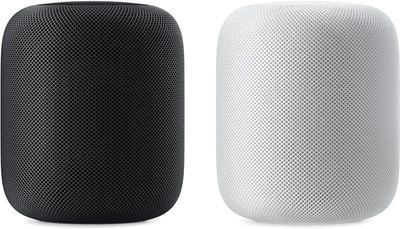
HomePod can be used for listening to music, but it's also a smart home device with built-in Siri functionality for controlling HomeKit products. Siri can also answer queries, set timers, place phone calls, and so much more, allowing the HomePod to serve as a music hub and an in-home personal assistant.
To differentiate the HomePod from the competition, Apple focused heavily on music quality. Due to its internals, HomePod is more expensive than a lot of competing products at $349, but you can sometimes find it on sale.
Sixth-Generation iPad (March)
Apple in March introduced a new sixth-generation iPad, which is packing a lot of features for its $329 price point.
It features a super fast A10 processor and Touch ID, and while it looks the same as the fifth-generation iPad, there's one important distinction -- the sixth-generation iPad supports the Apple Pencil.
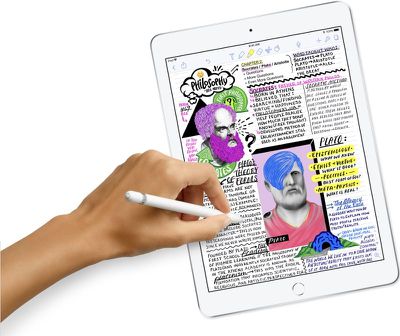
2018 is the year that we got an iPad that works with the Apple Pencil at a super low price point, making Apple's tablet and pencil accessory available to more people than ever.
MacBook Pro (July)
In July, Apple introduced revamped 13 and 15-inch MacBook Pro models with faster "Coffee Lake" chips with up to 6 cores.
The new 2018 MacBook Pro doesn't feature any visual changes, but with new Intel chips and Radeon Pro and Pro Vega graphics cards for the 15-inch model, Apple's biggest notebook is more powerful than ever.
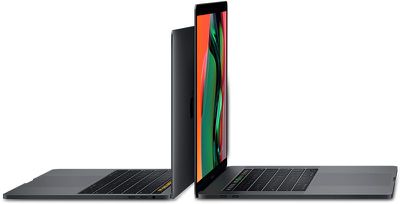
Apple's 2018 MacBook Pro models support up to 32GB of RAM, continue to offer a Touch Bar, and have a new third-generation butterfly keyboard that's meant to better hold up to dust and debris to prevent key failure.
There's a new T2 chip that offers enhanced security with secure boot and on-the-fly encrypted storage, and the new models support SSDs up to 4TB in size.
New Software (September)
New versions of iOS, macOS, tvOS, and watchOS were previewed in June at the Worldwide Developers Conference and released in the fall alongside new hardware.
iOS 12 brought features like improved performance, Group FaceTime with up to 32 people, customizable Memoji, and Siri improvements in the form of a new Siri Shortcuts feature designed to let you create multi-app multi-step shortcuts for automating tasks on your iPhone and iPad.
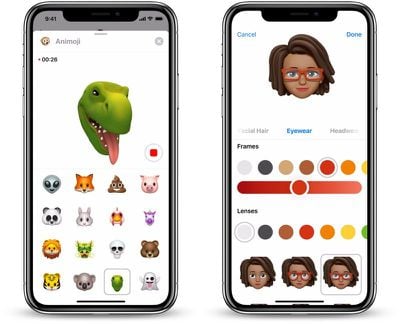
The update introduced a comprehensive set of time management and focus tools, such as a new Screen Time feature that's designed to let you know how much time you're spending on your iPhone, how long you're spending in apps, how often you pick up your phone, and which apps are sending the most notifications.
App limits were also included to help you cut down on usage, and Apple added more robust parental controls.
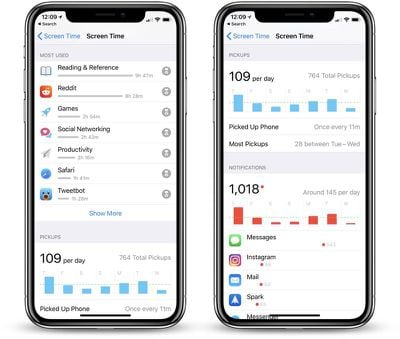
watchOS 5 brought Walkie-Talkie for communication, new Workout competitions for motivation, better notifications, and apps like Podcasts, while tvOS 12 introduced support for Dobly Atmos, new screensavers created in partnership with the International Space Station, and a zero sign-on feature designed to make it easier to sign into apps that require cable authentication.
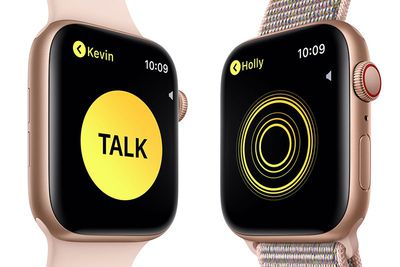
macOS Mojave introduced a long-awaited Dark Mode, Stacks for cleaning up a messy desktop, and a Dynamic Desktop feature with wallpapers that change subtly throughout the day.
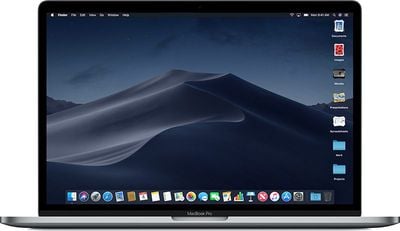
Finder gained customizable Quick Actions and a revamped Quick Look view for making file edits more quickly, while a new Continuity Camera feature added an option to import photos from an iPhone or iPad right into a document.
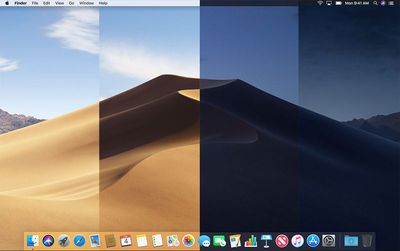
As part of an upcoming initiative to port iOS apps to Mac, Apple introduced multiple new apps, including Apple Stocks, Home, and Voice Memos, and as always, the update includes important security enhancements.
iPhone XR, XS, and XS Max (September and October)
Apple stuck with a three iPhone lineup in 2018, but expanded features like Face ID and an edge-to-edge display to all iPhones.
The iPhone XS and XS Max are natural successors to the original iPhone X, adopting an edge-to-edge OLED display, an improved dual-lens camera, Face ID, and a new super fast A12 Bionic chip.
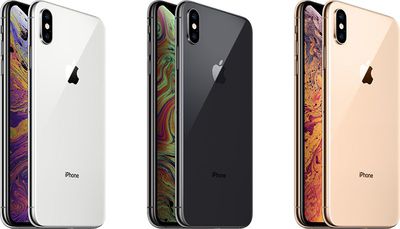
The iPhone XS and XS Max don't come cheap with prices starting at $999 and $1099, respectively, so Apple also introduced the iPhone XR, which has many similarities to the iPhone XS and XS Max but cuts some corners to keep prices lower.
Rather than using an OLED display, the iPhone XR features an edge-to-edge LCD, but it has the same Face ID system and A12 chip as the iPhone XS models. It doesn't have a dual-lens camera, instead adopting a single-lens camera, and it has slower LTE, no 3D Touch, and an aluminum frame instead of a stainless steel frame.
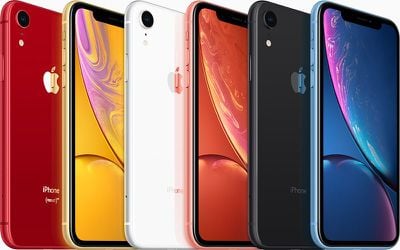
Despite these differences, many customers have been drawn to the iPhone XR because it's just as speedy as the XS, has a longer battery life, and has a lower starting price -- $749.
Apple released the iPhone XS and XS Max in September, but manufacturing on the XR was a bit delayed so it didn't come out until October.
Apple Watch Series 4 (September)
Alongside the new iPhone XS, XS Max, and XR, Apple introduced a revamped and redesigned Apple Watch, the Series 4. The Apple Watch Series 4 features the first ever Apple Watch redesign with a slimmer body and a display that's up to 30 percent larger.
Apple Watch models now measure in at 40 and 44mm, up from 38 and 42mm. A whole set of new watch faces came with the new larger display, and Apple introduced a black ceramic and sapphire crystal backing across the entire lineup.
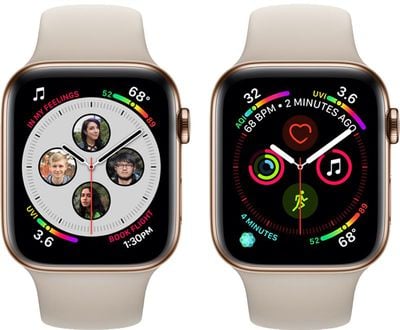
Apple continues to sell both GPS only and LTE models of the Apple Watch Series 4, and this version has a faster, more efficient S4 processor that offers 2x the speed, a new W3 wireless chip, and a 50 percent louder speaker.
There's a new set of electrodes in the Digital Crown which, when combined with the sensors in the back of the watch, can be used to capture a single-lead electrocardiogram right on the wrist, checking for atrial fibrillation.
Atrial fibrillation can be a sign of a serious health problem, letting Apple Watch users get early warnings about potential health issues. ECG readings are limited to the United States at this time because of the need for regulatory approval, but Apple is working on expanding availability.
iPad Pro (October)
In October, Apple introduced overhauled 11 and 12.9-inch iPad Pro models with iPhone X-style features. The new iPad Pro models have no Home button, with Apple instead introducing a larger edge-to-edge display and slimmed down bezels for more screen real estate.
With no Home button, the 2018 iPad Pro models unlock through the Face ID facial recognition system, which has been improved to accommodate either horizontal or vertical unlocking.
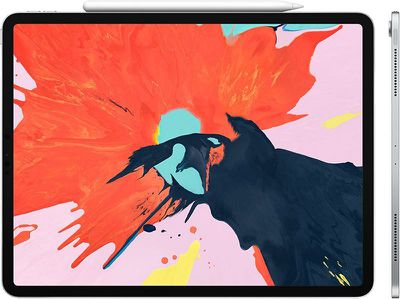
There's a fast A12X processor inside, and these are the thinnest iPads ever thanks to a redesigned body that's reminiscent of the iPhone 4 and the iPhone 5. This new redesigned body necessitated the removal of the headphone jack, another controversial move.
Both of these models support an all new Apple Pencil 2 that connects and charges magnetically, doing away with the Lightning connector on the original accessory. Speaking of Lightning, the new iPad Pro models feature a USB-C port instead of a Lightning port, allowing them to connect to more accessories than ever before.
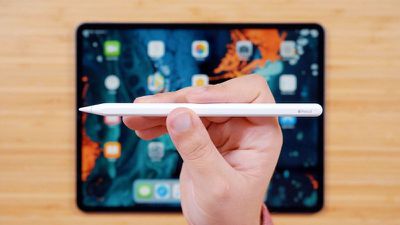
Mac mini (October)
The Mac mini got its first refresh in more than four years in October, with Apple introducing a new Space Gray machine that features quad to 6-core processors, Intel UHD Graphics 630, Thunderbolt 3 ports, and support for up to 64GB RAM and 2TB of storage.
No design changes were made to the Mac mini, but the internal layout was tweaked to support the new thermal needs of the faster processors.
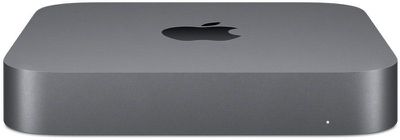
Apple's smallest desktop machine also includes a T2 chip for on-the-fly data encryption and HEVC video transcoding up to 30 times faster, along with a Secure Enclave to make sure the software you're loading during the boot process hasn't been tampered with.
The Mac mini's revamped, updated hardware hasn't come cheap, and the machine is now priced starting at $799.
MacBook Air (October)
October brought a surprise refresh of the MacBook Air, Apple's most affordable notebook. The new 13-inch machine features a Retina display for the first time with slimmer bezels for more available screen real estate.
It features two Thunderbolt 3 chips, Intel's 8th-generation chips, 16GB RAM, and support for up to 1.5TB of storage space. It too is equipped with the T2 chip designed to make Macs more secure, and it adopted a third-generation butterfly keyboard, a larger trackpad, and louder speakers.

The new MacBook Air features the same tapered design as the previous model, but it is 10 percent thinner and takes up 17 percent less volume. It has the longest battery life of any Apple notebook.
Prior to this update, the MacBook Air had not been refreshed for years and it was believed Apple would phase it out in favor of the 12-inch MacBook, but that didn't happen.
The new MacBook Air is more powerful than the 12-inch MacBook, and now that the two machines have the same display, there's not much setting them apart except for the 12-inch MacBook's slightly smaller body. The 12-inch MacBook did not get a 2018 update and it's not clear what will happen to it in the future.
What's Next?
Make sure to stay tuned to MacRumors, because tomorrow, we'll be highlighting all of the products that we expect to see from Apple during 2019. 2019 is shaping up to be an even bigger year than 2018, with a TV service on the horizon, a modular Mac Pro in the works, and new iPhones and iPads in development.
























